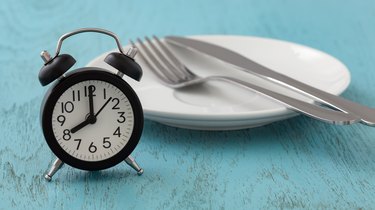
You've said sayonara to cookies, chips and virtually anything that comes in a bag or a box, so why haven't the pounds magically flown off your tummy, butt and hips? Alas, cutting out — or cutting back — on junky or processed foods in your diet doesn't automatically translate into weight loss.
"It's true that a foundational step toward losing weight is taking out highly processed junk food — that is, anything that has a label that reads more like a lab experiment and/or contains added sugar," says Liz Wyosnick, RDN, a registered dietitian in Seattle and owner of the private practice Equilibriyum.
Video of the Day
Video of the Day
A body of research has tied processed foods to weight gain, and indeed, a small-but-groundbreaking study published May 2019 in Cell Metabolism found that people who eat a highly processed diet are apt to take in about 500 more calories each day than those who eat unprocessed foods.
Read more: Trying to Lose Weight? This Is the One Food Group You Should Probably Cut (No, It's Not Carbs)
Oftentimes, though, nixing junk food isn't enough on its own. Here are a few other common reasons why the scale may not be moving in the right direction.
1. You’re Eating Too Much of a Good Thing
Healthy whole foods like avocado, coconut oil, red meat, nuts and cheese all get points for being high-protein, satiating options, but they are also calorie-dense, too. "The portion size can make a huge difference in the amount of fat and therefore calories consumed in a day," explains Wyosnick. One medium avocado, for example, has over 300 calories and 30 grams of total fat.
Fix it: When it comes to high-fat, high-calorie whole foods, sticking to healthy portion sizes is key.
- One-quarter of an avocado clocks in at 75 calories but will give you plenty of filling, good-for-you fat and fiber, says Wyosnick.
- Opt for just 1 ounce of nuts as a snack (160 calories, 14 grams of fat).
- When it comes to red meat, "Stick to the portion that will fit in your palm (without the fingers), which is about 4 ounces," says Wyosnick. You'll still get all the benefits of satiation, but you'll be doing your waistline a favor, too.
2. You’re Drinking Your Calories
Guzzling plenty of fluids is important for weight loss, since it supports digestion and helps your body flush out toxins, explains Wyosnick. But not all fluids are created equal.
Fruit juices, sugary coffee drinks and that extra glass of wine or two at dinner aren't doing you any favors. "I have clients who drink a ton of juice because they think it's healthy, but they also don't realize that it has a ton of calories," says Ellen Albertson, PhD, RDN, a nutritionist and psychologist in Burlington, Vermont. "Just because a food is healthier and not 'junk food' doesn't mean it's calorie-free."
Fix it: Keep drinking, but stick mainly to calorie-free water, black coffee, sparkling water and tea — and view that cocktail or full-fat cappuccino as an occasional indulgence, says Wyosnick.
Drink strategically, too. Try downing two cups of water 30 minutes before each meal. One study, published in the July-December 2014 issue of the Journal of Natural Science, Biology and Medicine found that this tactic can help reduce hunger and aids in weight loss over time.
And while organic fruit or veggie juices may sound healthy, they are laden with sugar and calories: Instead, eat the whole foods, which are also rich in filling fiber.
Read more: 6 Tricks to Help You Feel Fuller on Less Food

3. You’re Not Timing Your Meals Correctly
Whether you're skipping meals or noshing throughout the day, both ends of the meal timing spectrum can inhibit weight loss, says Wyosnick. If you graze constantly, you're likely consuming extra calories throughout the day that make it harder to shed fat. But waiting too long to eat — or forgetting a meal entirely — can also backfire because it may leave you so ravenous that you eat everything in sight.
Fix it: Wyosnick recommends eating every three and a half to four hours during a 10- to 12-hour daytime eating period. "This meal-timing strategy supports steady blood sugar control and means that during the times between meals, and overnight, fat reserves are used more readily," she explains.
Try to front-load as many of your calories as possible, too: Big breakfast eaters experienced more than twice the amount of weight loss compared to big dinner eaters at the end of 12 weeks, according to a March 2013 study published in the journal Obesity.
4. You Overcompensate for Exercise With Food
You may feel virtuous ordering that protein shake at your gym's juice bar after your spin class, but there's a chance you may not actually need those extra calories, says Wyosnick. Pre- and post-workout snacks can be beneficial, but only if they're timed and portioned appropriately with your other food intake.
Fix it: If it has been more than two hours since your last meal, it's a good idea to have a small snack before your workout, to help you power through it, advises Wyosnick. If it's after your workout and your next meal is more than two hours away, have a small, protein-packed snack to aid in recovery.
But if you're exercising close to meal times, it's probably a better idea to wait to refuel at your next meal, so you're not consuming extra calories.

5. You’re Not Getting Enough Sleep
When the amount of time you spend sleeping goes down, your weight goes up, says Los Angeles-based sleep expert Michael Breus, PhD, author of The Power of When.
It doesn't take long to see these effects, either: One study published April 2013 in the Proceedings of the National Academy of Sciences found that just a week of sleeping five hours a night (instead of the recommended seven to eight) led participants to gain an average of 2 pounds.
"Sleep deprivation causes changes to hormones that regulate hunger and appetite: It reduces leptin, which suppresses appetite, and raises ghrelin, which triggers hunger," Breus says. It also causes your body to churn out more cortisol, he adds, which creates more intense cravings for fat-laden foods. The result? You're more likely to have a second or third helping of steak and skimp on low-calorie and low-fat fare like veggies.
Fix it: Prioritize getting enough zzzs each night. For most people, that's about seven and a half hours, says Breus. And don't fall into the trap of thinking you can make up lost sleep time on the weekends, either. "You want to stick to the same bedtime and wake up time throughout the week, because when your sleep has a regular rhythm, your biological clock will be in sync, and all your other bodily functions — including your metabolism — will run more smoothly," he explains.
Have a hard time getting to (or staying in) dreamland? Check out 10 habits that are ruining your sleep and get expert tips on how to fix them.
- Journal of Natural Science, Biology and Medicine: "Effect of excessive water intake on body weight, body mass index, body fat, and appetite of overweight female participants"
- Obesity: "High Caloric intake at breakfast vs. dinner differentially influences weight loss of overweight and obese women"
- Nutrients: "Exercise and the Timing of Snack Choice: Healthy Snack Choice is Reduced in the Post-Exercise State"
- Cell Metabolism: "Ultra-Processed Diets Cause Excess Calorie Intake and Weight Gain: An Inpatient Randomized Controlled Trial of Ad Libitum Food Intake"
- Proceedings of the National Academy of Sciences: "Impact of insufficient sleep on total daily energy expenditure, food intake, and weight gain"